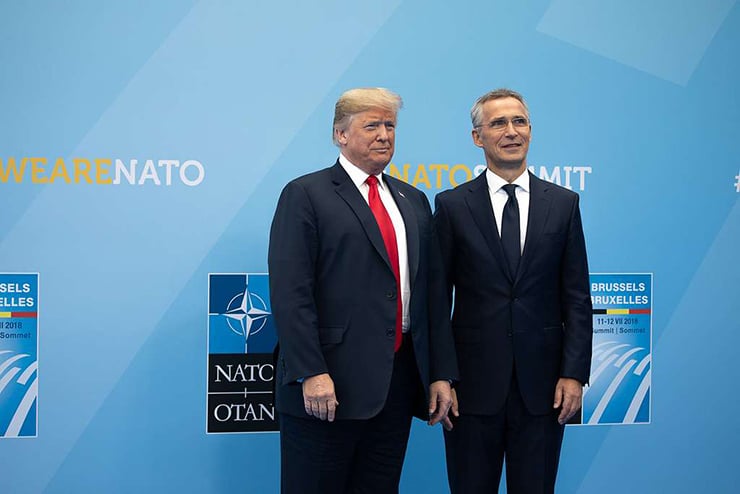The dust has settled on the 2024 Republican primary and Donald Trump appears likely to walk away not only with the nomination but also surprisingly good odds of adding a 47 to his MAGA cap. As reality set in for America’s corporate media, they were forced to contemplate what the reality of a second Trump presidency might look like.
One of their worst fears was expressed by the Washington Post, which breathlessly reported that Trump, *gasp!*, may actually be serious about withdrawing the U.S. from NATO.
The Post’s dyspeptic outburst stems from a wry comment dropped by the former president at a campaign rally in South Carolina while speaking of the failure of many NATO members to pay their share of the alliance’s burden. Here is the way the Post reported it:
“One of the presidents of a big country stood up and said, ‘Well, sir, if we don’t pay and we’re attacked by Russia, will you protect us?’” Trump told an audience at a campaign rally in South Carolina. “I said, ‘You didn’t pay. You’re delinquent.’ He said, ‘Yes, let’s say that happened.’ No, I would not protect you. In fact, I would encourage them to do whatever the hell they want.” The anecdote sparked cheers and applause from the attendees.
The Biden administration immediately blasted the remarks as “appalling and unhinged.”
For the Post, a mouthpiece of the Washington D.C. “foreign policy consensus,” the thought of exiting the 75-year-old NATO alliance created for a Cold War world that no longer exists, is unthinkable. Trump’s insistence that the United States stop paying the bill for NATO members that haven’t paid their share for decades seems petty to these Beltway expert classes. It never occurs to them that, to the voters who put Trump in office, the idea seems like good, old-fashioned, common sense. Despite the many ways global organizations like NATO project U.S. power abroad and serve the vocational and remunerative interests of Beltway denizens, it does not, in fact, have a divine right to exist.
The Post went on express its worst fears with added fearmongering, courtesy of none other than John Bolton, Trump’s turncoat former national security adviser. Trump “wanted excuses to get out, whereas the rest of us wanted NATO allies to spend up to their commitments and more, because it’s for their own good and it would strengthen NATO,” Bolton told the Post. “This is a case where you’ve got to take him literally.”
The corporate media describes Trump’s onetime allies like Bolton and former Secretary of Defense James Mattis approvingly because they reliably “hemmed in some of Trump’s most unconventional defense ideas.”
Speaking of “unconventional defense ideas,” the so-called bipartisan border bill pushed by Sen. Mitch McConnell in February had the unconventional idea of securing the border by spending more on military aid … to Ukraine. As Sen. J.D. Vance has pointed out, besides the obvious Ukraine spending giveaways, the bill would have made deviating from the foreign policy establishment’s wishes about Ukraine grounds for another round of impeachment by requiring funding for that war-torn country well into the next presidential term.
Whatever one may think about Ukraine or continued U.S. involvement with NATO, this kind posturing on the part of Washington elites ought to give one pause. Who are these self-appointed experts in Washington who presume to block voters and their president from seeing their wishes carried out? More to the point, as Angelo Codevilla surely would have said, “Who the hell do they think they are?”
Congress these days always seems to find a way to avoid answering to voters. Just as it has shirked its lawmaking power by pawning off most of it to regulatory agencies and permanent bureaucrats, it behaves similarly with respect to foreign policy. Rather than exercising the powers the people have given it, like the power to declare war, it declines all action for which it may be held accountable. But if permanent Washington (or, more importantly, its donors) want war with Russia, Congress will find a way to carry one out without declaring it.
If we are not at war with Russia, however, then America’s foreign policy respecting that country is supposed to be determined by the president—as are our alliances and treaty obligations. Congress can decline to fund the president’s objectives and adventures if it differs with him (though currently it does not), but it does not have the authority to set that policy or to hold over a foreign policy it prefers from one administration to the next. A future president who more accurately reflects the wishes of the electorate in the upcoming election should not be bound by the wishes of the current Congress (or its donors). To suggest otherwise is to endorse the usurpation of power from the people themselves, and as such ought to insult even those who agree with the general directives of the usurpers.
The largest obstacle to “making America great again” may be our seeming inability to make Congress do its job again, which starts with making them understand that they answer to the will of the American people.

Leave a Reply